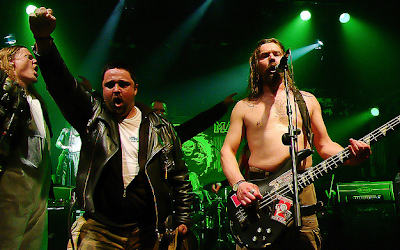Performers of this cosmopolitan rock are the Moscow bands Splin and Mumii Trol‘, and therefore the solo performer Naik Borzov. Cosmopolitan rock is additionally performed by Blast, one in all the rising bands that perform solely in English and for English-speaking audiences.
 |
| Mumii Trol' |
There are two elements where nationalist rock is concerned: Anti-Western sentiment (this is why Russian nationalist rock frequently doesn't sound like Western rock), and its carnivalesque conceptualization.
The ‘anti-Westernism’ of Russian nationalist rock manifests itself in its deliberate amateurism. Amateurism here becomes a style of protest against Western rock perceived as soulless, overproduced and company. Nevertheless, it still borrows heavily from the arsenal of Western rock traditions in terms of the bluesy musical progressions and other traditional rock instruments' full line up.
It's as if Russians are saying:
"We don't wish to play like you, however we are going to use what we want from your treasure-trove to form our purpose".
As a consequence, national rock musicians typically quite effectively mix Western and Russian traditions by ‘bluesyfying’ Russian folks or pseudo-folk tunes and by using Western-style electronically-enhanced or distorted sound to play music that sounds as distinctly national and ‘un-rock-like’ as potential. The musicians bring into play the made tradition of native Russian folks and pop genres: jail songs, criminal underworld songs, urban songs, love songs, urban romances, rural ballads, agrarian songs, revolutionary songs, Soviet war and pop songs, ancient Odessa Klezmer songs, Russian vaudeville and cabaret songs, Russian Gypsy tunes and so on.
 |
| Naik Borzov |
Russian nationalist rock is basically conceptual. Usually it is serving an idea instead of purely musical one. The carnivalesque presumes temporary suspension of the traditional rules governing society and therefore the substitution of such rules with temporary new ones. Carnival presumes going back to a national humorist tradition: merry-making, buffoonery, clowning, invoking a circus atmosphere and interesting within the satirizing of everyday reality. It deals with things that otherwise are taboo in society like sex and gluttony. Closely associated with these taboos is that the Bakhtinian juxtaposition of official and unofficial culture found in every society. These carnivalesque parts are the redeeming issue of Russian nationalist rock, that makes it fascinating and very very unusual.
 |
| Splin |
Within the realm of nationalist rock throughout the Nineties and into the first years of the twenty-first century is found the foremost original and inventive and most specifically Russian of the rock bands. However, this can be not a replacement tradition. The tradition had already began to develop back in mid-1960s when Alexander Gradsky created his band Skomoroki to sing solely original songs and solely in Russian, and when Vetry Peremen began to introduce in their music parts of Russian folks and church traditions. to the current trend belonged Zvuki Mu within the Eighties, along with Kalinov Most, Nol’, Brigada-S, the DK band of Sergei Zharikov, Alexsander Bashlachev and Yanka Diagileva and, of course, Grazhdanskaia Oborona. within the Nineties and into the first years of the twenty-first century the simplest and therefore the brightest of Russian rock musicians are nationalist to some extent. Some, like Grazhdanskaia Oborona, Kalinov Most, Mongol Shuudan and Korroziia Metalla, lean towards right wing nationalism. Others, like the new St Petersburg ska band, Leningrad, and Moscow’s lounge-lizard buffoon Garrik Sukachev, are merely patriotic. parts of nationalism are to be found within the post-Soviet work of Akvarium, Mashina Vremeni and Mango Mango.
 |
| Korroziia Metalla |
Perhaps the best inventive divide at intervals Russian rock apply of the first twenty-first century tales place along lines of gender. feminine rock musicians, stepping off from the amateurish nationalist post-punk tradition and towards the polished sound of pro-Western bands have managed to mix these 2 trends into a fine looking and notably Russian synthesis. while not sacrificing musicianship, smart quality arrangements and tunefulness, they need managed to bring into their music an array of parts from the vocal techniques and instruments (of folks|of folks|of people} music to folk music harmonies and melodies. As a result, performers like Rada Anchevskaya (Rada), Inna Zhelannaia, Ol’ga Aref’eva, Zemfira, Nastia, Umka and therefore the band Kolibri manufacture an exquisite mix of the national folks tradition and Western rock.
At the start of the twenty-first century Russian rock was a awfully complicated phenomenon and was still researching the method of finding its identity.
___________________